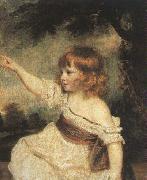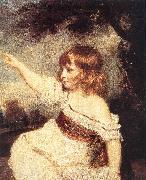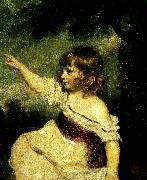Wholesale Oil Painting Reproductions No Minimum and Door to Door! |
|||||||||||
|
|
|||||||||||

|
|||||||||||
|
|
|
||||||||
All Sir Joshua Reynolds Oil Paintings |
||||||||
|
|
||||||||
|
|
||||||||
|
Artist Introduction: British
1723-1792
Sir Joshua Reynolds Locations
Reynolds was born in Plympton, Devon, on 16 July 1723. As one of eleven children, and the son of the village school-master, Reynolds was restricted to a formal education provided by his father. He exhibited a natural curiosity and, as a boy, came under the influence of Zachariah Mudge, whose Platonistic philosophy stayed with him all his life.
Showing an early interest in art, Reynolds was apprenticed in 1740 to the fashionable portrait painter Thomas Hudson, with whom he remained until 1743. From 1749 to 1752, he spent over two years in Italy, where he studied the Old Masters and acquired a taste for the "Grand Style". Unfortunately, whilst in Rome, Reynolds suffered a severe cold which left him partially deaf and, as a result, he began to carry a small ear trumpet with which he is often pictured. From 1753 until the end of his life he lived in London, his talents gaining recognition soon after his arrival in France.
Reynolds worked long hours in his studio, rarely taking a holiday. He was both gregarious and keenly intellectual, with a great number of friends from London's intelligentsia, numbered amongst whom were Dr Samuel Johnson, Oliver Goldsmith, Edmund Burke, Giuseppe Baretti, Henry Thrale, David Garrick and fellow artist Angelica Kauffmann. Because of his popularity as a portrait painter, Reynolds enjoyed constant interaction with the wealthy and famous men and women of the day, and it was he who first brought together the famous figures of "The" Club.
With his rival Thomas Gainsborough, Reynolds was the dominant English portraitist of 'the Age of Johnson'. It is said that in his long life he painted as many as three thousand portraits. In 1789 he lost the sight of his left eye, which finally forced him into retirement. In 1791 James Boswell dedicated his Life of Samuel Johnson to Reynolds.
Reynolds died on 23 February 1792 in his house in Leicester Fields, London. He is buried in St. Paul's Cathedral. |
||||||||
|
|
||||||||
|
Master Hare Painting ID:: 3546 |
1788
Musee du Louvre, Paris |
|||||||
Height Width |
INS/CM Quality |
|||||||
|
X |
| |||||||
|
|
||||||||
All REYNOLDS, Sir Joshua Oil Paintings |
||||||||
|
|
||||||||
|
|
||||||||
|
Artist Introduction: English Rococo Era Painter, 1723-1792
English painter, collector and writer. The foremost portrait painter in England in the 18th century, he transformed early Georgian portraiture by greatly enlarging its range. His poses, frequently based on the Old Masters or antique sculpture, were intended to invoke classical values and to enhance the dignity of his sitters. His rich colour, strong lighting and free handling of paint greatly influenced the generation of Thomas Lawrence and Henry Raeburn. His history and fancy pictures explored dramatic and emotional themes that became increasingly popular with both artists and collectors in the Romantic period. As first president of the Royal Academy in London, he did more than anyone to raise the status of art and artists in Britain. His Discourses on Art, delivered to the students and members of the Academy between 1769 and 1790, |
||||||||
|
|
||||||||
|
|
Master Hare Painting ID:: 8900 |
1788-89
Oil on canvas, 77 x 64 cm
Mus??e du Louvre, Paris |
||||||
Height Width |
INS/CM Quality |
|||||||
|
X |
| |||||||
|
|
||||||||
All Sir Joshua Reynolds Oil Paintings |
||||||||
|
|
||||||||
|
|
||||||||
|
Artist Introduction: British
1723-1792
Sir Joshua Reynolds Locations
Reynolds was born in Plympton, Devon, on 16 July 1723. As one of eleven children, and the son of the village school-master, Reynolds was restricted to a formal education provided by his father. He exhibited a natural curiosity and, as a boy, came under the influence of Zachariah Mudge, whose Platonistic philosophy stayed with him all his life.
Showing an early interest in art, Reynolds was apprenticed in 1740 to the fashionable portrait painter Thomas Hudson, with whom he remained until 1743. From 1749 to 1752, he spent over two years in Italy, where he studied the Old Masters and acquired a taste for the "Grand Style". Unfortunately, whilst in Rome, Reynolds suffered a severe cold which left him partially deaf and, as a result, he began to carry a small ear trumpet with which he is often pictured. From 1753 until the end of his life he lived in London, his talents gaining recognition soon after his arrival in France.
Reynolds worked long hours in his studio, rarely taking a holiday. He was both gregarious and keenly intellectual, with a great number of friends from London's intelligentsia, numbered amongst whom were Dr Samuel Johnson, Oliver Goldsmith, Edmund Burke, Giuseppe Baretti, Henry Thrale, David Garrick and fellow artist Angelica Kauffmann. Because of his popularity as a portrait painter, Reynolds enjoyed constant interaction with the wealthy and famous men and women of the day, and it was he who first brought together the famous figures of "The" Club.
With his rival Thomas Gainsborough, Reynolds was the dominant English portraitist of 'the Age of Johnson'. It is said that in his long life he painted as many as three thousand portraits. In 1789 he lost the sight of his left eye, which finally forced him into retirement. In 1791 James Boswell dedicated his Life of Samuel Johnson to Reynolds.
Reynolds died on 23 February 1792 in his house in Leicester Fields, London. He is buried in St. Paul's Cathedral. |
||||||||
|
|
||||||||
|
|
master hare Painting ID:: 69394 |
se |
||||||
Height Width |
INS/CM Quality |
|||||||
|
X |
| |||||||
|
|
||||||||
|
Prev Next
|
||||||||
|
|
||||||||
|
Related Paintings to Sir Joshua Reynolds :. |
||||||||
|
|
||||||||
|
CONTACT US |



